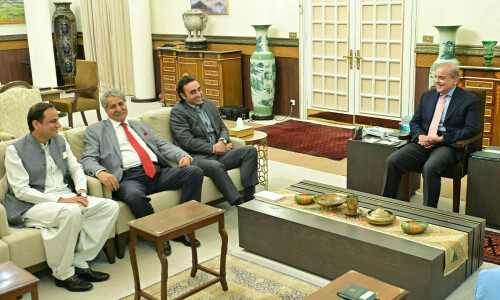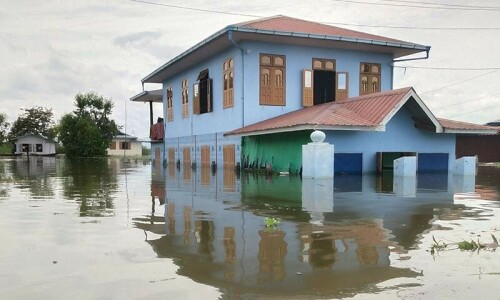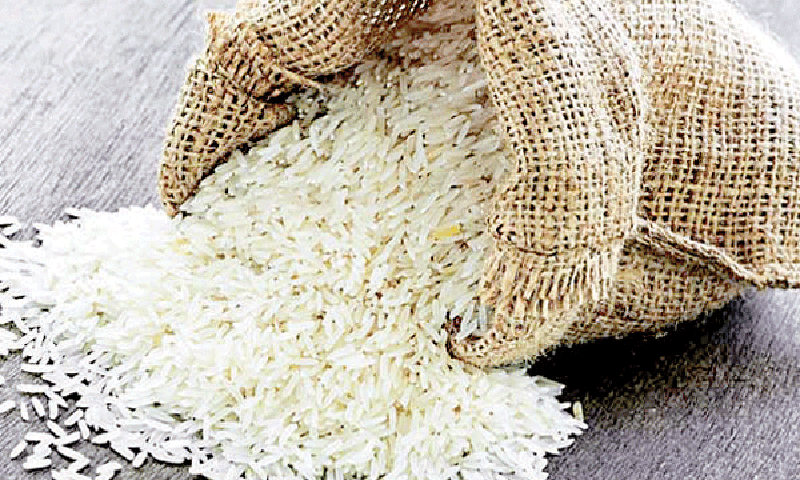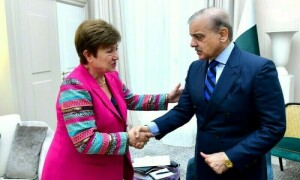‘Hot pursuit’ chorus
The chorus of American voices calling for action against militants in Pakistan continues to grow. In separate interviews with the Houston Chronicle, three US Congressmen have revealed that American commandos are poised to stage ‘hot pursuit’ raids inside Fata to “stem mounting Taliban attacks against US troops in Afghanistan and to disrupt resurgent Al Qaeda operatives’ efforts to map strikes against the US homeland.” The New York Times, meanwhile, has reported that foreign fighters are converging on Pakistan’s tribal areas to join with militants already there. Alarmingly, the Times noted: “The flow may reflect a change that is making Pakistan, not Iraq, the preferred destination for some Sunni extremists from the Middle East, North Africa and Central Asia who are seeking to take up arms against the West.” This has come on the back of the news that the US aircraft carrier, Abraham Lincoln, has moved from the Persian Gulf to the Arabian Sea to support US operations inside Afghanistan, where the number of attacks are up in the east of the country by forty per cent from a year ago. Clearly the mounting violence in Afghanistan is ratcheting up the pressure on the Bush administration, which has just six months left in office. Tough choices lie ahead for the US, Afghanistan and Pakistan in the next few months. Speaking to the media in Kuala Lumpur, Prime Minister Syed Yousuf Raza Gilani emphasised that “peace and stability in Afghanistan is in the interest of Pakistan which shares a long porous border,” with Afghanistan.
The question is how to bring that peace and stability to Afghanistan and Pakistan’s tribal areas. There is little doubt that unilateral American action inside Pakistan will inflame the Pakistani street and trigger a wave of retaliatory attacks by militants in Pakistani cities. The Pakistan government’s new recipe for dealing with the militancy is to pursue an agenda of peace talks and economic development backed up by the use of force against recalcitrant militants. While the talks may lead to a reduction in violence inside Pakistan, it is highly unlikely that the militants will abide by any agreement, if ever reached, to cease and desist from launching attacks against the Afghan and US-led International Security Assistance Force inside Afghanistan.
Two things must happen for a disaster to be averted. First, the US must cool the talk of military action inside Pakistan. Second, Islamabad must act more firmly against the militants, especially the Taliban redoubts inside Fata. A disingenuous debate on whether Pakistan is fighting an American war or our war has clouded the fact that no state can tolerate militants who obey no authority other than their own on its soil. The only people who ought to be welcomed from the Middle East, North Africa and Central Asia in Pakistan are tourists, businessmen and academics, not militants out to remake the regional order to their own liking.
A matter of life
Besides, it is an undeniable fact that the pharmaceutical sector has registered a phenomenal growth in recent times. The local component has led the charge which now enjoys 48 per cent share in the market. The expansion itself contradicts the industry’s argument about its falling financial health. The problem basically lies with the amount that it spends on promotional activities that, according to a conservative estimate, forms as much as 60 per cent of its budget. The ministry would do well to invite independent professional opinion on the issue before finalising its proposal. As things stand today, in the absence of a fulltime health minister, the bureaucracy is about to err on the side of the entrepreneurs.
Wasteland of hope?
Karachi’s backwater of Lyari stands a world away from our spirited metropolis. The bloodshed in the suburb has taken on epic proportions as people live their lives at gunpoint. Its homegrown gang leaders, Abdul Rehman Dakait and Ghaffar Zikri, have long waged a bloodstained battle against each other — a petty turf war that has turned the area into a virtual ghost town. According to a report in this newspaper, even the police have strict orders not to venture into the lanes and alleyways. Strangely enough, the seemingly ungovernable territory constitutes a mere six per cent of Lyari and is home to approximately 14,000 people. Earlier in the month, community leaders of the economically depressed area, considered to be the stronghold of the PPP, made an appeal to the party leadership to address their woes — unbridled crime being the prime curse — but the party has since been accused of turning a deaf ear. Lyariites also deplore the fact that the new budget allocates a mere Rs73m to this indigent locality, while the previous government had raised the amount from Rs79m to Rs87m.
However, the long overdue ‘siege and search operation’, which began this week, may be a step in the right direction. The police, amply aided by the Rangers, have finally ventured into Lyari’s strife-torn, gangster-infested pockets and set up pickets. Officials claim that they have arrested many suspects and recovered arms and ammunition. It is imperative that provincial and city governments, both of which have so far played a negligible role, implement specific, foolproof security mechanisms such as discreet CCTVs, an empowered and impartial police presence and the elimination of political patronage to criminal gangs to ensure sustainable law and order in the ravaged district. But Lyari’s predicament extends far beyond a simple ‘ceasefire’. As the locality limps back to life, it grapples with many deeper wounds; there is the question of displaced residents whose homes have been plundered and, in many cases, razed to the ground. Then there are families that have lost breadwinners to mindless gunfire and youngsters who have either been injured or crippled. The administration has to join forces with philanthropists and NGOs to begin a large-scale rehabilitation programme for Lyari and its wounded. This will entail employment and financial compensation — the only tools that can rebuild lives.
OTHER VOICES - Pushto Press
Series of blasts
Khabroona, Peshawar
SEVEN consecutive blasts in Karachi led to many casualties in different parts of the city. On July 6, on the anniversary of the Lal Masjid operation, a conference was held in Islamabad. A suicide attack was carried out as soon as the conference ended and 22 people were killed, most of them policemen on duty.
Bomb blasts and suicide attacks are nothing new in Pakistan, and the most fatal year in this regard was 2007. The attacks were largely the result of the previous government’s policies vis-à-vis the war on terror. Terrorist activities subsided when elections were held on Feb 18, 2008.
The election results proved that the previous government’s policies were flawed in nature. The parties that won the elections had promised the people that they would not repeat the mistakes of the previous government.
As time passed, the present government came to adopt the same old policy of the previous government of using force alone and then signing abortive peace deals. This seems to have triggered the present wave of suicide attacks and bomb blasts.
It would be wise on the part of the coalition government not to repeat past mistakes and fulfil its responsibility of representing the people who voted it to power. The government would do better if it took decisions within the country instead of looking up to someone outside. — (July 8)
War on terror
Wahdat, Peshawar
US officials have praised Pakistan’s role in fighting terrorism on several occasions but at the same time press Pakistan to do more in the war on terror. America, Afghanistan, India and some other countries have been blaming Pakistan for not doing enough to eliminate Al Qaeda sanctuaries in Pakistan.
Pakistan has been a close ally of the international community in the war on terror. Right after the war started, Pakistan arrested and handed over several Al Qaeda leaders to the US. Pakistan consequently became the target of Al Qaeda-led terrorism and suffered a great deal as a result. If Pakistan had not cooperated with the US, America’s fate in Afghanistan would have been the same as the USSR’s in the past. [But] the US and other countries still insist that Pakistan must do more. If Pakistan is not doing enough, why is it that Al Qaeda does not threaten non-Muslim countries and targets Pakistan which is an Islamic country? Afghanistan, India and the US must explain this to the people of Pakistan.
Pakistan is a key ally in the global war on terror but it is not strong enough to meet the onslaught of Al Qaeda alone. Pakistan needs to be strengthened. It needs to be given all the support it needs to repel attacks by Al Qaeda and its affiliates in Pakistan and Afghanistan. — (July 8)
— Selected and translated by Khadim Hussain.
Rise of Islamic finance
ISLAMIC finance signifies financial services, mechanisms, practices, transactions, and instruments that comply with the provisions given in the fundamental Islamic texts.
Thus, Islamic finance not only includes banking, but also capital formation, capital markets and all types of financial intermediation.
While there are similarities between Islamic and western financial systems, certain norms and transactions are exclusive to Islam. In fact, some Islamic financial restrictions are severe enough to render certain western financial practices and transactions absolutely void. For instance, transactions involving riba (interest and usury) and gharar (uncertainty and excessive risk) are prohibited.
Over the years, Islamic finance has not only increased in size, but has also grown complex as finance professionals compete furiously to produce new sharia-compliant transactions and instruments. This innovation is most visible in the world of sukuk. Generally referred to as Islamic bond, sukuk signifies, speaking more accurately, an investment certificate.
The Accounting and Auditing Organization for Islamic Finance Institutions (AAOIFI) defines sukuk as certificates of equal value put to use as common shares and rights in tangible assets, usufructs, and services or as equity in a project or investment activity. AAOIFI sets sukuk apart from equity, notes, and bonds. It is made clear that sukuk are not debts of the issuer; they are interests in underlying assets or investment activities.
Sukuk can be classified as (1) those that offer predetermined returns, and (2) those that offer sharing of profit and, in certain cases, loss. “Sukuk al-ijara” belongs to the first category; “sukuk al-mudaraba” and “sukuk al-musharaka” fall in the second category. Of course, there are other sukuk structures as well. All structures employ techniques that are well developed in conventional markets for structured finance, and have become a significant mechanism for raising finance in the international markets by institutions, corporations, and sovereign and state entities.
The market for sukuk has grown tremendously in recent years (from less than $8 billion in 2003 to $50 billion by mid-2007) as sukuk provides issuers with access to the huge and growing Islamic liquidity pool, in addition to the conventional investor base. In 2006, banks — including UBS, ABN Amro, Barclays, Deutsche Bank, and Societe Generale — underwrote 190 sukuk issues, raising more than $27 billion.
Though Malaysia and the GCC countries are the centres for sukuk issuance, its issuance is not limited to Muslim countries: there is a growing number of issuers based in the United States, Europe, and other parts of Asia. For instance, in June 2006, the US saw the issuance of its first sukuk in Texas by Houston-based oil and gas concern East Cameron Partners, which raised $166 million.
Sukuk are offered in specialised exchanges such as the Labuan Exchange in Malaysia, the Third market in Vienna, and the Dubai International Finance Exchange. They are assessed and rated by international rating agencies, and are mostly issued in US dollars. However, this issuance in US dollars means currency risk for all non-dollar investors.
It must be mentioned that not all sukuk structures are beyond controversy. It is an unfortunate fact that, at times, in order to create an Islamic product, finance professionals blithely re-engineer a conventional one and then sprinkle it with Arabic names and terminology. To an ordinary investor, Arabic alone is often enough to prove the Islamic nature of the instrument or transaction. In fact, last year, a prominent Muslim scholar openly questioned the Islamic credentials of sukuk structures and claimed that most of them were in violation of Islamic law. He particularly referred to mudaraba sukuk and musharaka sukuk.
Interestingly, as reported by The Financial Times, people are already trying to revive the sukuk structures declared unacceptable by the scholar. Financial engineers are reworking the mudaraba and musharaka structures in an effort to make the once-popular instruments satisfy the requirements of Muslim clerics and customers alike. The sukuk market is already turning the corner, with banks such as Credit Suisse reporting promising developments.
In fact, the sukuk markets are expected to grow further as there are over $1,000 billion worth of infrastructure projects planned in the Gulf over the next decade and majority of these projects will be seeking sharia-compliant funding.The future of Islamic finance, in general, and sukuk, in particular, does not look gloomy — at least, as long as the Arab oil money is around. However, Muslims need to be careful while devising new products. They need to make sure that Islamic principles are properly observed and that they don’t present an un-Islamic idea as Islamic just because there is more profit in it. It is a fact that Islamic financial products generally pay fewer returns than their western counterparts and, consequently, western investors are less inclined towards putting their funds in sharia-compliant schemes. But Islamic finance is mainly for Muslims. There is no need to compromise the standards just to make things more acceptable to the western markets.
Fallout of Kabul blast
THE July 7 blast in Kabul, which left behind a trail of devastation, will scar the political landscape of the region. The attack targeted the Indian embassy compound in the heart of Kabul city and was carried out by a speeding vehicle loaded with explosives. It was a suicide attack, a phenomenon now all too familiar to people on both sides of the Durand Line.
The Afghan government lost no time in accusing Pakistani intelligence agencies of masterminding the attack. More than 40 people including India’s military attaché and a political counsellor were killed and more than 140 wounded, some of them seriously, in the deadliest attack in the city since the fall of the Taliban.
The security cordon around Kabul city is as effective as it can be under the circumstances. How could a vehicle carrying explosives in such a huge quantity penetrate the defences of the Afghan capital and slip through the many check-posts in the centre of the city? The tragedy underlines a serious security lapse and raises questions about the role and capacity of the Afghan intelligence agencies that are funded so generously by foreign donors.
The blast has exposed the fragile administrative structure that has been in place in the country for some time now. The breakdown of institutions remains one of the biggest impediments to good governance in matters of security, law and order, intelligence gathering, economic uplift programmes, reconstruction, etc. In the absence of adequately trained and sufficiently motivated civil servants, it remains a gigantic task to put in place viable institutional mechanisms that could deliver on vital fronts such as the collection of timely intelligence — a failure that we share with the Afghans.
The allegation of Pakistani involvement, although a routine diatribe, is wholly inconsistent with the ground realities. Firstly, why should Pakistan choose to be a party to an incident for which it would inevitably be blamed by the Afghans? What would Pakistan gain as a result of such a dastardly attack? Thirdly, the United States wields enormous influence in both Afghanistan and Pakistan. How could Pakistan encourage such an act which runs totally contrary to US policy?
If anyone really believes that such an attack will damage India’s ties with Afghanistan, he is living in a fool’s paradise. Such incidents help cement relations still further.
For Pakistan the attack would have been an act of double jeopardy. Accusing fingers would be pointed at Islamabad, furthering the trust deficit between Pakistan and Afghanistan. At the same time, it would cast a shadow on the composite dialogue between Islamabad and New Delhi.
The most recent development in the context of the insurgency in Afghanistan is that a growing number of Tajiks, Uzbeks and Turkmen are joining the Taliban movement. It is possible that some of these new entrants to the insurgency may be involved in the attack. Taking advantage of their non-Pakhtun identity, they may have organised the logistics for the blast.
There are also strong groups within the Afghan government that have serious differences with the president on many issues, mostly personal. They too could have engineered the attack. Such is the scale of their anger and acrimony that it would not be illogical to assume that such elements indeed had a hand in the blast.
Pakistani policymakers and diplomats are confronted with a huge damage-control challenge. Islamabad must firmly see out this very difficult phase in its relations with Kabul as well as Delhi. In doing so, it should not place total reliance on official contacts. Once the spadework has been done and the dust has settled, Pakistan should seek to promote people-to-people contacts as a means of a sustainable and constructive engagement with its two vital neighbours.
The writer is a former ambassador to Afghanistan.











































Dear visitor, the comments section is undergoing an overhaul and will return soon.